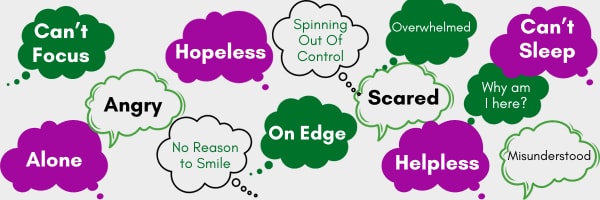
Perinatal mental health disorders (PMHD) are any unfavorable or devastating mood changes that occur during pregnancy and postpartum. They include:
Signs and symptoms vary from person to person. They can range from mildly difficult to paralyzing. Examples include:
- No longer enjoying things that once brought joy
- Changes in eating and sleeping patterns
- Extreme fatigue/insomnia
- Constant worry
- Irritability
- Feelings of anger and/or guilt
- Self-criticism
- Scary or intrusive thoughts
- Inability to care for yourself or your baby
- Thoughts of harming yourself or your baby
- Mania
- Delusions or hallucinations
Though mental health disorders can affect anyone at any point in their lives, they are even more common during pregnancy and postpartum.

Perinatal mental health disorders do not discriminate. Anyone can be affected. However, certain risk factors can increase the likelihood of someone developing a PMHD, such as:
- Personal history of a mental health disorder
- Untreated anxiety/depression
- Emotionally or physically difficult pregnancy
- Traumatic birthing experience
- Fertility challenges
- Previous miscarriage or infant loss
- Baby in NICU
- Financial or relational difficulties
- Big life changes like a change in housing, work or relationship status
- Little or no support system
- Infant feeding complications
- Physical pain
Can partners develop a perinatal mental health disorder? Yes, and there is help available for them too! Click here for more information.

The following anonymous comments were shared during our Perinatal Emotional Support Group:
- “It feels like an emergency only you know is happening… Like everything is on fire.”
- “It feels scary.”
- “Everything feels hopeless.”
- “I feel like no one understands.”
- “I can’t sleep even when my baby is sleeping.”
- “I can’t concentrate.”
- “I don’t remember the last time I laughed or felt joy.”
- “I have no energy to care for myself or my baby.”
- “My head and thoughts feel like they are spinning out of control.”
- “Everything seems to get on my nerves. I find myself getting angry at everything.”
- “I worry and have scary thoughts about purposely or accidentally harming my baby.”
- “Sometimes I feel like my baby would be better off without me.”
- “There are times when I feel like I would rather be dead than go on feeling like this for one more second."

Studies show that when compared to their white counterparts, people of color are more likely to struggle with their mental health during pregnancy and postpartum. They are also less likely to receive treatment due to barriers, such as:
- Systemic racism
- Adverse child experiences
- Lack of access to affordable, quality healthcare
- Distrust in medical professionals
- Lack of representation in the medical system
- Unemployment
- Language barriers
- Documentation stressors
- Family separation
- Generational trauma
- Cultural expectations/standards
Signs and symptoms may look different for women/birthing people of color. Some additional changes to look for are:
- Irritability
- Fatigue/insomnia
- Self-criticism
- Decreased libido
- Inability to experience any pleasure

Whether you are pregnant, plan to become pregnant or have recently had a baby, here are some ways to start working on your mental health.
Educate Yourself
- Take childbirth and postpartum classes
Self-Care
While self-care may seem like an afterthought during this time, taking care of yourself is a basic human function that needs to be met.
- Make sure you are getting enough sleep. This is key to good health – both physically and mentally.
- Eat well and stay hydrated.
- Shower/bathe regularly.
- Do something that makes you feel happy. Try taking a walk, watching your favorite show or moving your body/stretching.
Social Support
- If there are people in your life who can help you out, let them. This could mean letting someone do your grocery shopping, help you with laundry, watch your newborn while you sneak in a nap or simply be a listening ear to talk with.
- Attend an online support group.
- Check out the social media support through Postpartum Support International or The Perinatal Mental Health Alliance for People of Color.
- Look into a home visiting program. Talk to your social worker or community healthcare worker for more information.
Professional Counseling
Talking to a professional can help you work through your feelings. There are local therapists that provide counseling and are specially trained to work with mothers/birthing persons. A Bronson social worker can also work with you to find counseling services or make a referral. Find some options through the Perinatal Mental Health Directory, provided by Postpartum Support International.
Medication
If you are feeling any signs of a PMHD, talk to your primary care provider or OB/GYN. They can prescribe you medications that are safe to take during pregnancy/postpartum. They can also refer you to additional resources that can help you take control of your mental health.
It is also important to note that if you are newly pregnant and currently taking medication, do NOT abruptly stop. Talk with your healthcare provider first. If they are unsure of the medication you are taking, they can consult with perinatal psychiatry through the University of Michigan’s MC3 program or Postpartum Support International’s psychiatric consult line.